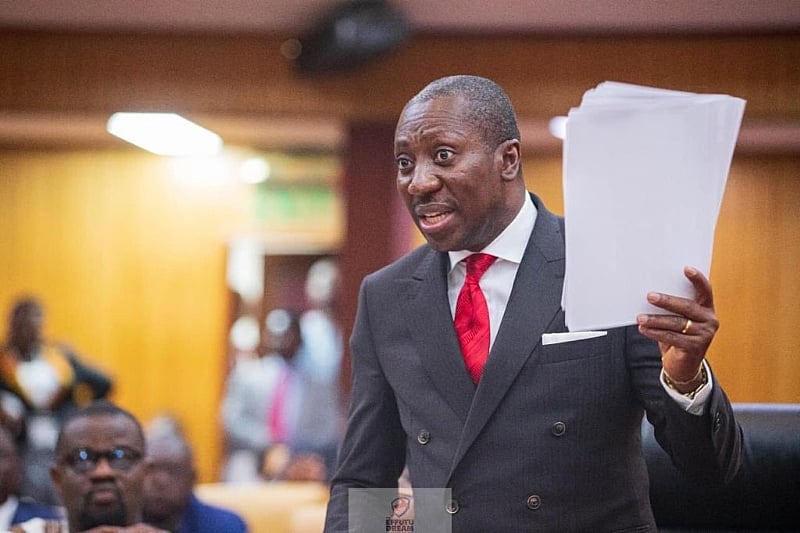The Minority Leader, Alexander Afenyo-Markin, delivered a scathing indictment of the Mahama administration’s economic and social policies, portraying them as a deliberate dismantling of the progress achieved under the previous New Patriotic Party (NPP) government. Afenyo-Markin’s critique, delivered during the concluding debate on the 2025 Mid-Year Budget Review, painted a stark contrast between the two administrations, highlighting what he characterized as the current government’s misguided priorities and detrimental impact on Ghana’s development trajectory. He accused the Mahama government of prioritizing short-term gains from illegal mining, or “galamsey”, over sustainable development initiatives, thereby jeopardizing the environment and fostering lawlessness. This focus on “GoldBod,” as he termed it, was presented as emblematic of the administration’s flawed economic approach.
Central to Afenyo-Markin’s argument was the accusation that the Mahama administration, dubbed the “Apostles of Reset,” had systematically dismantled key flagship programs initiated by the NPP. He cited the “1D1F” (One District, One Factory) initiative, designed to stimulate industrial growth and job creation across the country, as a prime example of this alleged sabotage. According to Afenyo-Markin, the current government’s actions have stifled this industrial revolution, leading to economic stagnation and undermining the potential for localized production and employment. He portrayed the government’s approach as a betrayal of the vision for broad-based economic development envisioned by the previous administration.
Furthermore, the Minority Leader extended his criticism to the health sector, lamenting the alleged abandonment of the “Agenda 111 Hospitals” project. This initiative, aimed at expanding healthcare access and laying the foundation for medical tourism, was, according to Afenyo-Markin, effectively “killed” by the current administration, leaving communities deprived of essential healthcare services. This alleged neglect, he argued, demonstrates a disregard for the well-being of the Ghanaian people and a failure to build upon the progress made in strengthening the nation’s healthcare infrastructure. Similarly, he condemned the perceived dismantling of the “Planting for Food and Jobs” program, an initiative designed to bolster food security and empower farmers. This program, according to Afenyo-Markin, has been “slaughtered” by the current government, jeopardizing food security and abandoning farmers to their own devices.
The Minority Leader’s critique extended beyond domestic policy, encompassing Ghana’s international standing. He accused the Mahama administration of weakening Ghana’s diplomatic position on the global stage, alleging that the government’s actions had eroded the country’s international influence and alienated its allies. This portrayal of a diminished international presence served to further underscore Afenyo-Markin’s overall narrative of decline and mismanagement under the current administration. His assertions painted a picture of a Ghana losing its footing on the world stage, a stark contrast to what he presented as the stronger international relationships cultivated under the previous NPP government.
Afenyo-Markin’s address can be interpreted as a strategic preview of the opposition’s campaign message leading into the next election cycle. By highlighting what he presented as the failures of the Mahama administration across multiple sectors, he aimed to sow seeds of doubt regarding the government’s competence and direction. This preemptive strike serves to lay the groundwork for the NPP’s campaign, framing the upcoming election as a choice between the alleged stagnation under the current administration and the perceived progress achieved during the NPP’s tenure. The emphasis on discontinued initiatives and alleged mismanagement seeks to resonate with voters concerned about economic development, healthcare access, food security, and Ghana’s international standing.
The forceful language employed by Afenyo-Markin – using terms like “murdered,” “killed,” and “slaughtered” – underscores the starkness of the opposition’s message. This rhetoric is designed to create a strong emotional response and solidify the narrative of a government actively dismantling the foundations of progress laid by its predecessor. By presenting such a stark dichotomy between the two administrations, Afenyo-Markin sought to position the NPP as the only viable option for restoring Ghana’s development trajectory and reclaiming its position of strength both domestically and internationally. This framing of the political landscape sets the stage for a potentially contentious election cycle, with the NPP likely to continue highlighting these alleged failures in an effort to regain power.


